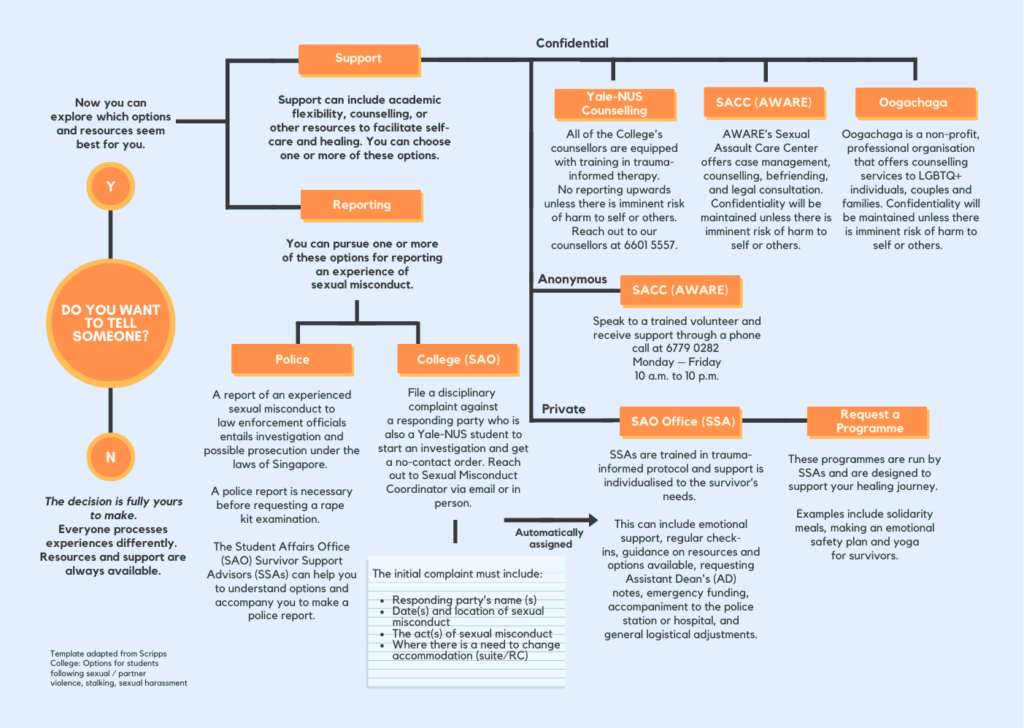If you have experienced an incident that you think may be sexual misconduct/assault, it is important to care for yourself and to seek help from others who can care for you.
How to…
Get Help
- Medical Care
- Safety
- Off-campus resources
- On-campus resources
- Support & healing
- File a report
Report
- File a report
- Policies and procedures
- Federal laws and policies
- Confidentiality
Support a Survivor
- Helping a friend
- Self-care
- For faculty and staff
- Academic support
Learn More
- Definitions
- Attending a healing circle
- Access healing tools
- Available reading materials
Get Help
Speak to an AWARE SACC staff member who is trained to help and listen to those who have faced sexual assault or feel unsure about a sexual encounter.
Financial support is available for students who wish to use the SACC as a resource.
Please approach your Survivor Support Advisor for more information on how to receive funding for this. If you do not yet have a Survivor Support Advisor, please reach out to reach out to either of our current advisors.
Speak to an Oogachaga staff member who can provide emotional support for issues related to survivor support. Oogachaga is an organisation working with LGBTQ+ individuals.
Financial support is available for students who wish to use Oogachaga as a resource (only for survivor support related counselling)
Please approach your Survivor Support Advisor for more information on how to receive funding for this. If you do not yet have a Survivor Support Advisor, please reach out to reach out to either of our current advisors.
Report
You can pursue one or more options for reporting an instance of experienced sexual misconduct – filing a disciplinary complaint under the College’s policy on sexual misconduct and/or filing a police report. However, it is equally valid to choose to do nothing at the moment or to confide in a friend or to seek counselling on or off-campus.
1. Disciplinary Action
You can choose to file a formal disciplinary complaint against a respondent who is also a Yale-NUS student. Approach Ashley Yong, Sexual Misconduct Coordinator, to discuss this option further, or review the Sexual Misconduct Policy.
Yale-NUS Policies and Procedures on Sexual Misconduct
Sexual misconduct involves particularly sensitive issues which require careful investigation and handling.
The disciplinary procedures at Yale-NUS set out here are specifically designed to ensure that reports of sexual misconduct are investigated in a fair and objective manner whilst protecting the privacy and interests of the students involved.
Students wishing to open a sexual misconduct case where a staff/faculty member of Yale-NUS College is the responding party can reach out to Ashley Yong, Sexual Misconduct Coordinator or the Acting Dean of Students to submit a reporting letter. Students can also make a disclosure of sexual misconduct to Human Resources, the Acting Dean of Students, or Student Affairs Office. A disclosure means that a report is filed but a case is not opened. Follow this link for more details on the reporting options available.
Confidentiality
With regards to issues of sexual misconduct, maintaining confidentiality is taken very seriously. Though the College’s primary concern is ensuring the safety of students and employees and providing access to resources, we will strive to ensure that high standards of confidentiality are retained.
When reviewing allegations of sexual assault or misconduct, the College will take all reasonable steps to investigate and respond to a reporting party in a manner that is consistent with high standards of confidentiality. Confidentiality is not always possible or appropriate; the College has a responsibility to balance the requests for confidentiality with our institutional responsibility of ensuring a safe educational environment and workplace. However, we will always be communicative with the reporting and responding parties in the event that any information needs to be shared.
2. Police Report
You can also file a police report against the respondent. A report of experienced sexual misconduct to law enforcement officials entails investigation and possible prosecution under the laws of Singapore. Seek on-campus assistance and support for filing a police report from any Residential Life Officers or Assistant Deans, Survivor Support Advisors and/or off-campus assistance from the AWARE SACC.
*A reporting party who has submitted a police report may still initiate disciplinary action, so long as these efforts would not interfere with any on-going law enforcement proceedings.

Learn More
Every person’s journey to healing looks different. These are the various resources available to you, and you may choose to access them whenever you are ready.
Learn more about the terms used to describe sexual misconduct.
These books can be found in the Intercultural Engagement Office inside of the Student Affairs Office.
BOOKS
- Life, Reinvented: A Guide to Healing from Sexual Trauma for Survivors and Loved Ones by Erin Carpenter
- You Can Help: A Guide for Family and Friends of Survivors of Sexual Abuse and Assault by Rebecca Street
- The Sexual Healing Journey: A Guide for Survivors of Sexual Abuse by Wendy Maltz
- The Body Keeps The Score: Brain, Mind and Body in The Healing of Trauma by Bessel van der Kolk
WORKBOOKS
- Beautiful Redemption: Reclaiming Life After Rape (Workbook) by Staci Luker
- You Have A Right To Be Angry: A workbook to help survivors get in touch with their anger and heal by Elizabeth Joy Sellman
- We Believe You Coloring Book by Ryerson University
- The Sexual Trauma Workbook for Teen Girls by Raychelle Cassada Lohmann and Sheela Raja
- The Complex PTSD Workbook: A Mind-Body Approach to Regaining Emotional Control & Becoming Whole by Arielle Schwartz
Contact our Survivor Support Advisors (SSA)




